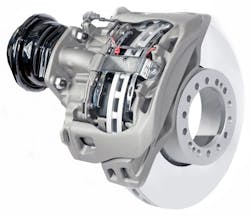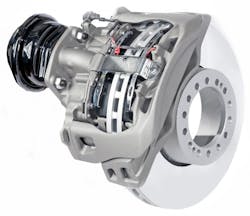Stopping power: Effective brake maintenance
During Roadcheck 2015, the Commercial Vehicle Safety Alliance’s targeted enforcement event held over three days this past June, out-of-service rates dropped to new lows. In particular, violations found during inspections of braking systems continued to decline, reflecting that fleet maintenance programs are increasingly more effective at finding and fixing potential problems before vehicles hit the road.While results of Roadcheck 2015 were just announced at the end of last month, the findings of the CVSA’s annual Brake Safety Week inspection campaign held in early September will not be known for some time. Brake Safety Week is part of the Operation Airbrake program that CVSA sponsors throughout North America in partnership with the Federal Motor Carrier Safety Administration. During the weeklong campaign, inspectors conduct brake system inspections to identify out-of-adjustment brakes and other violations.At past Roadcheck events, brake-related violations comprised the largest percentage of all out-of-service violations. During the roadside Brake Safety Week, inspections of brake system components were conducted to identify loose or missing parts, air leaks, worn linings, pads, drums or rotors, and other faults. Antilock braking system malfunction indicator lamps were checked as well. Inspectors also measured pushrod stroke when appropriate, and in participating jurisdictions overall vehicle braking efficiency was tested using performance-based brake testing equipment. These systems include a slow speed roller dynamometer that measures total vehicle weight and total brake force. Those measurements are then used to calculate braking efficiency. Roadcheck data is a clear indicator that fleets understand that braking systems must be inspected and maintained so they function properly, notes Rick Martin, training manager for Meritor aftermarket. “While fleets and technicians are very familiar with traditional cam brakes,” he says, “they should also be prepared for inspection and maintenance requirements when they adopt air disc brake systems.”Air disc brakes are being specified on a small percentage of tractors, Martin points out, and at higher levels on trailers. “There is a maintenance benefit with air disc brakes,” he states. “Their simpler design means there are time and labor savings because air disc brakes have fewer external components than cam brake systems.”Air disc brake inspection training is important, Martin notes. “Brake balance can be an issue like it is with cam brakes,” he adds, “so we discuss the need to use a dial indicator to measure the clearance between the pads and the rotor to ensure proper brake balance, and functioning of the automatic adjuster.”Air disc brake system suppliers offer maintenance manuals that detail inspection procedures. Also available are online, on-site and classroom training courses so fleets can train technicians to properly inspect and maintain air disc brake systems.”Improperly maintained brake systems can reduce braking ability and pose a safety risk,” Martin says. “Correct service procedures must be observed to ensure that air disc and cam brakes provide peak performance throughout the foundation brake system’s working life.”

